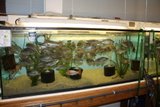Masha
Aquarium Advice FINatic
Good points, Delapool. And I suppose some fish will deal better with some things (ph change for example) than other fish.
But sorry for being dim, what is TDS? Total dissolved solids? Is there a way of measuring this?
The reason I'm asking about this is because I'd like to scale down a little on the amount of water I'm changing, especially if the amount I'm doing now (50%) is stressing the fish. But I don't want to compromise water quality, of course. At the moment, my nitrate levels are fairly low at the end of the week, about 12.5 if I remember correctly. But I'm having to over-feed a bit to make sure my bottom feeders get SOMETHING to eat and I'm a bit stressed about that.
Also I've got some emersed plants that are (hopefully) taking some of those nitrates out...
And I just don't trust my ability to tell if the fish are stressed. Guess I'm just going to have to try it and see what happens.
But sorry for being dim, what is TDS? Total dissolved solids? Is there a way of measuring this?
The reason I'm asking about this is because I'd like to scale down a little on the amount of water I'm changing, especially if the amount I'm doing now (50%) is stressing the fish. But I don't want to compromise water quality, of course. At the moment, my nitrate levels are fairly low at the end of the week, about 12.5 if I remember correctly. But I'm having to over-feed a bit to make sure my bottom feeders get SOMETHING to eat and I'm a bit stressed about that.
Also I've got some emersed plants that are (hopefully) taking some of those nitrates out...
And I just don't trust my ability to tell if the fish are stressed. Guess I'm just going to have to try it and see what happens.



